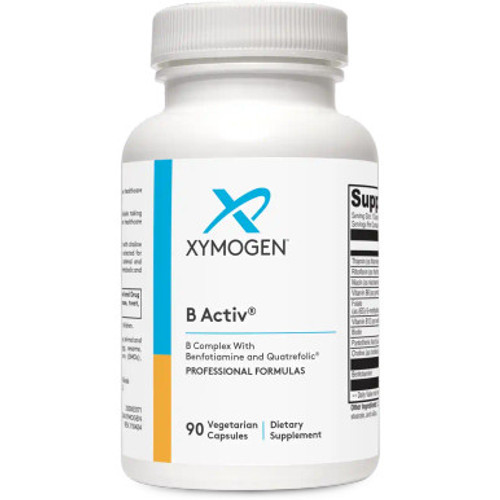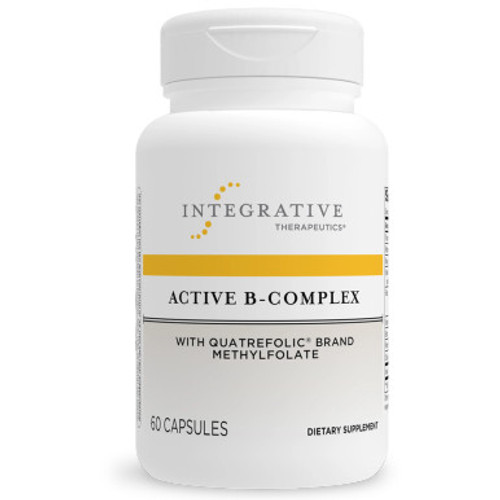B Activ by Xymogen
B Activ by Xymogen is a dietary supplement formulated with a comprehensive spectrum of B vitamins. It features activated forms of vitamins B2, B6, and B12; benfotiamine, a fat-soluble, more physiologically active form of thiamin; and folate as Quatrefolic™, which is proven to have greater stability, solubility, and bioavailability compared to calcium salt forms of 5-MTHF.† This supplement is designed to support the body's adrenal, neurological, and stress-related functions.B vitamins are essential for many metabolic processes, and B Activ provides a balanced blend of these nutrients in their most bioavailable forms. B vitamins are known to support a healthy energy metabolism, promote healthy cognitive function, and help maintain a healthy nervous system. Additionally, they are necessary for the production of red blood cells and for proper functioning of the immune system.The activated forms of B vitamins in B Activ allow for superior absorption and utilization by the body, making it a unique product in the marketplace. Furthermore, the inclusion of benfotiamine and Quatrefolic™ provide additional benefits not found in other B vitamin supplements. By taking B Activ, individuals can benefit from the essential B vitamins in a form that is highly bioavailable.*
- Supports Carbohydrate Metabolism*
- Supports Healthy Nervous System/Adrenal/Immune Function*
- Supports Cardiovascular Health*
- Supports Healthy Mental Function and Mood*
Suggested Use:
Xymogen suggests taking one capsule once or twice daily, or as directed by your healthcare professional.
Xymogen suggests taking one capsule once or twice daily, or as directed by your healthcare professional.
Serving Size: 1 Capsule
Servings Per Container: 90 or 180
Amount Per Serving:
Thiamin (as thiamine HCl) 20 mg
Riboflavin (as riboflavin 5’-phosphate sodium) 20 mg
Niacin (130 mg as niacinamide and 10 mg as niacin) 140 mg
Vitamin B6 (as pyridoxal-5’-phosphate) 20 mg
Folate (as Quatrefolic® (6S)-5-methyltetrahydrofolic acid, glucosamine salt) 400 mcg DFE
Vitamin B12 (as MecobalActive™ methylcobalamin) 400 mcg
Biotin 400 mcg
Pantothenic Acid (as d-calcium pantothenate) 150 mg
Choline (as choline dihydrogen citrate) 30 mg
Benfotiamine 20 mg
Other Ingredients: Capsule (hypromellose and water), stearic acid, magnesium stearate, and silica.
Does Not Contain: Gluten, wheat, yeast, corn protein, soy, dairy or animal products, artificial sweeteners or colors, or preservatives.
Storage: Store tightly closed in a dry, cool place.
Trademarks:
S1. Quatrefolic® is a registered trademark of Gnosis S.p.A. Produced under U.S. Patent 7,947,662.
S1. Quatrefolic® is a registered trademark of Gnosis S.p.A. Produced under U.S. Patent 7,947,662.
 Click here to view Data Sheet
Click here to view Data SheetLEGAL NOTICE: Xymogen's Exclusive Professional Formulas are available through select licensed health care professionals. The Internet Sale and Discounting of XYMOGEN formulas are strictly prohibited.







